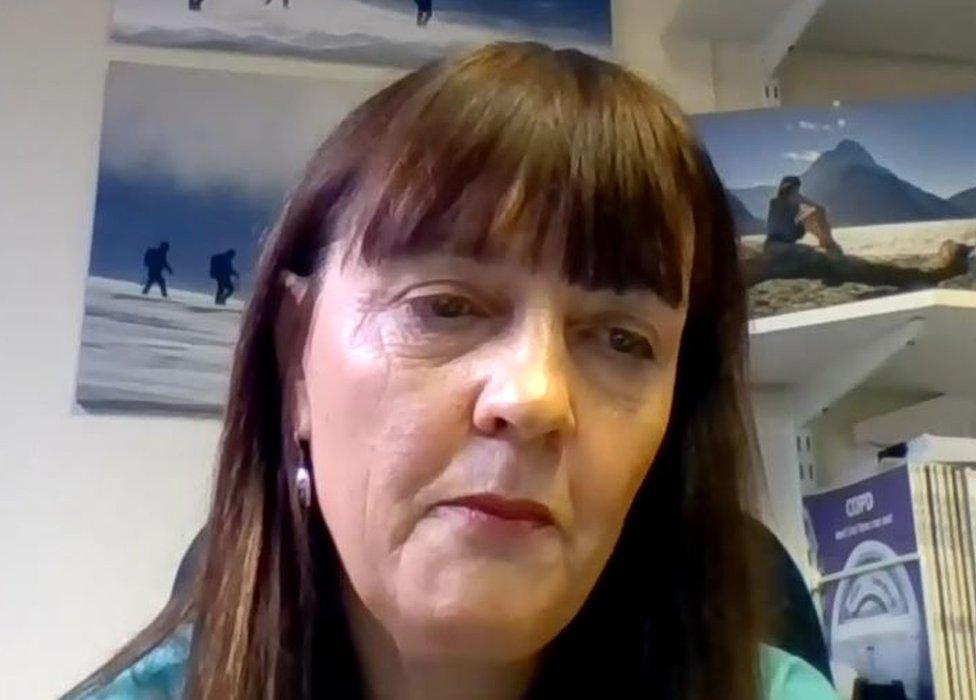Coronavirus: Warning for men over 50 due to Covid-19 threat
- Published
'I probably shouldn't have made it'
Men older than 50 who want to see next Christmas must be extra vigilant, a senior doctor has warned.
It comes as coronavirus continues to prominently affect this section of the population.
The warning was made by Dr Wendy Anderson, a respiratory consultant at the Northern Health Trust.
The Department of Health (DoH) said it was aware of concerns and was assessing the situation, "with a view to updating guidance and messaging if required".
However, in a statement it added that Covid-19 was a threat to "many different age groups and sections of society".
Speaking to BBC News NI, Dr Anderson said many of those she saw in hospital beds and struggling to breathe were men above the age of 50.
She said she decided to make the appeal after losing too many patients and friends to the virus.
While some tend to be overweight, not all of them are, and some have been fit and healthy.
"They are dependent on a ventilator to breathe and they could be there for weeks, men of this age are twice as likely to die than women from the virus," said Dr Anderson.
'I thought I was going to die'
Figures seen by BBC News NI show about 60% of admissions to hospitals in Northern Ireland are men while up to 80% of admissions to intensive care are also male.
"There are three long grey fingers on local and national data - that's men 50-60; men 60-70 and finally men aged 70-80," said Dr Anderson.

Dr Wendy Anderson is appealing for caution and for people to stick to the guidance
"They go into intensive care as they are mostly young and we want to try and save them."
One of those people behind the statistics is Brendan Greene. He was 58 when he contracted the virus and was admitted to ICU in April.
"I pretty much thought they were my last days," he said. "I thought I was going to die."
Mr Greene, from Ballymoney, had been doing heavy outside work a week before he fell ill. He also cycled and regarded himself as being fit and healthy.
"Initially I had a severe headache and a tightness across my chest but then suddenly I was gasping for breath."
'We were lucky'
At one stage Mr Greene, who was in intensive care for five weeks, said goodbye to his wife Nuala as his condition deteriorated.
Nuala said it was a very "scary time".
"You just never know when it could come to your own front door," he said.
"It came to ours and we were lucky. I'd rather have to wear a mask as opposed to having to wear a breathing mask on a ventilator."
The couple who have been married for 34 years, have three grown up children and two grandchildren.
Sitting in their living room and holding hands they said that little things such as hugs now mean so much.
Meanwhile, Dr Anderson said she did not know why this section of the population was so vulnerable.
"It might be to do with them being overweight and their breathing is laboured. Having to turn them in intensive becomes a lot more difficult and puts their lungs under additional pressure," she said.
"But they can do something about it. I am appealing to them, especially in the next couple of weeks if they meet the younger ones - please keep your distance. You are vulnerable. Wash your hands, wear a mask."
"This is the last leg of the war. A vaccine is coming. Live by the rules if you want to see Christmas 2021."
The DoH said it closely monitored data and emerging trends from hospitals in relation to Covid-19 incidence.
The spokesperson said: "It is important to emphasise that Covid-19 is a threat to many different age groups and sections of society.
"No one should assume they are immune because of their age, gender or background."